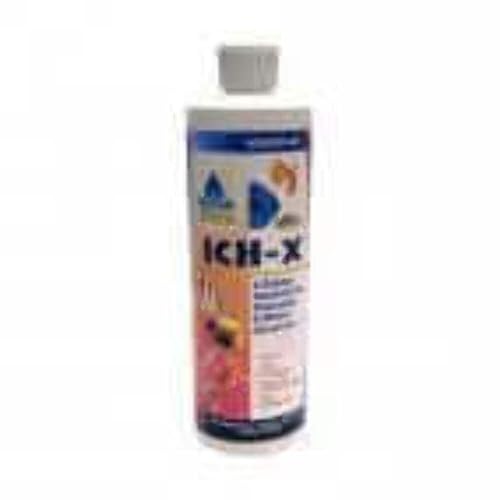Affiliate Disclaimer:
FishKeepingAnswers.com is reader-supported. When you buy through links on our site we may earn a commission.
White spots that appear on guppies are caused by a disease called Ichthyophthirius multifiliis which is often shortened to Ich. Ich is highly infectious and, if left untreated, can quickly spread to every guppy in the aquarium.
Guppies are probably the world’s most popular freshwater tropical fish. They are colorful, hardy, and easy to breed. Guppies are now available in an almost endless range of colors, patterns, and tail shapes.
I first started keeping guppies about 30 years ago when I was given my first 10-gallon aquarium and a small group of guppies. From that day forward I have bred and raised thousands of guppies. I can’t imagine a time when I didn’t have at least one tank full of guppies in my fish room.
Why Do My Guppies Have White Spots?
Although guppies are a very hardy species of fish, they do occasionally succumb to the disease known as Ich. Ich, or Ichthyophthirius multifiliis to give it its scientific name, is a disease that is known to take advantage of sick or stressed guppies.
The white spots you see on your guppies are actually cysts caused when the Ich parasite burrows into the skin of the infected fish. You may initially only see one or two white spots on your guppies, but Ich quickly spreads and multiples until it completely takes over your guppy tank.
I recently had an outbreak of Ich in one of my guppy breeding tanks after I added some new guppies that were given to me by a friend. Unfortunately, I failed to quarantine the new guppies and, unbeknown to me, they were infected with Ich already. Luckily I noticed the spots quickly and was able to treat the whole tank.
What Is Ich
The visible white spots we call Ich are actual cysts caused when the guppy’s skin swells after the parasite has burrowed into the guppy’s skin.
Once the parasite has attached itself to the guppy, it will stay there for a number of days, feasting on the guppy’s blood. After gorging itself, the parasite will drop off the host fish and sink to the bottom of the aquarium, where it will stay whilst it divides itself into hundreds of baby parasites called ‘tomites’. These tomites quickly go in search of a new host and the process starts all over again.
What Are The Symptoms Of Ich In Guppies?
The two main symptoms of Ich in guppies are;
White Spots
In the very early stages of Ich, a guppy may only have a couple of spots and the presence of Ich may not be obvious. Left untreated, the number of spots will quickly multiply. Your guppy may look like it has lots of bits of sand or grains of salt on its body.
Rubbing against rocks or the gravel
Researchers believe that the Ich parasite irritates the guppy. It may be that Ich feels like mosquito bites. Guppies with Ich will often rub their bodies against hard surfaces in the aquarium such as rocks, pieces of wood, the substrate, or the aquarium glass.
How To Treat A Guppy With Ich
Fortunately, there are some very good treatments for Ich on the market. I have had very good success using Ich-X which is made by Hikari (check the current price of Ich-X on Amazon). When treating with Ich-X, I treat at the recommended rate of 5ml per 10 gallons (38L) of aquarium water.
If you are based in Europe, eSHa 2000 is a really effective treatment for Ich.
It is important to note that the only time the Ich parasite is vulnerable to treatment is whilst it is free-floating in the aquarium during the tomite stage. At no other time are we able to effectively treat our guppies for Ich.
- Hikari ich x 4oz
- The most widely respected formulation for the treatment of ich
- Additives & supplements
Last update on 2024-10-24 / Affiliate links / Images from Amazon Product Advertising API
Treating Guppies For Ich Without Using Chemicals
If you want to treat guppies for Ich without using chemicals, you can try increasing the water temperature.
By raising the temperature to between 80°F and 82°F (26°C and 28°C) the lifecycle of the Ich parasite is sped up considerably. Instead of the lifecycle taking 4 to 5 days to complete, the parasite will drop off the guppies and into the gravel within a day or so. Combining the increased temperature with daily gravel vacuuming should mean all the parasites are removed before they have a chance to reattach to another guppy.
I have used this technique in the past to good effect, but it does require daily or twice daily gravel vacuuming without fail for a week to 10 days. If you miss a day, and the parasite hatches out and enters the water column, you may have to carry on for a further 7 to 10 days.
How To Prevent Guppies Getting Ich
As with all guppy ailments, prevention is better than cure. Stopping your guppies getting Ich in the first place is the best course of action.
To prevent my guppies from getting Ich, I try to follow the regime below religiously.
- Quarantine ALL new guppies
- When in quarantine, treat with Ich-X as a precaution
- Maintain good water quality in all guppy tanks
- Feed guppies with good quality food
In Conclusion
The majority of the time our guppies get white spots they are suffering from Ich. Ich can quickly take over a tank full of guppies and, if left untreated, will often prove fatal for all tank inhabitants.
When you first see the signs of Ich, treat the tank, either using Ick-X or another suitable Ich treatment. The sooner you act, the more likely all your guppies will make a full recovery.








